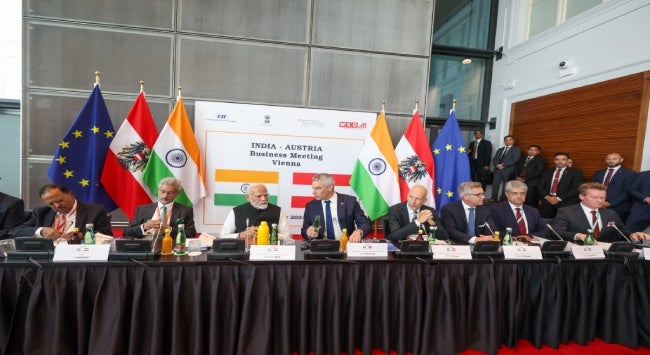Summary
India’s foreign policy will not veer much with the Bharatiya Janata Party’s recent victory in India’s general elections. Continuity, not change, will feature.
What will the Bharatiya Janata Party (BJP) and Prime Minister Narendra Modi’s return for a third term mean for Indian foreign policy? India’s foreign policy will stay the course. The broader strategic context will remain: China represents the overriding strategic challenge. New Delhi will seek to develop and modernise its military and economic capabilities to manage and deter China’s rise. While an immediate rapprochement between New Delhi and Beijing is hard to imagine, it is in their mutual interest to set up guardrails to prevent the border standoff from escalating into an unanticipated crisis. The now emboldened opposition could press the BJP-led government on China, given the tense border situation, making negotiations with China more challenging.
Diplomatically, attempting to balance China will mean India doubling down on relationships with the West, especially the United States (US) and its allies and partners, including the European Union (EU), Japan and Australia. The last decade witnessed several historical breakthroughs in US-India ties, particularly security cooperation, with China giving New Delhi and Washington enough reasons to elevate their strategic partnership. Both countries now discuss areas of bilateral concern like maritime security, climate change, infrastructure and energy cooperation at other ‘minilateral’ mechanisms like the Quadrilateral Security Dialogue (Quad), I2U2 (India, Israel, United Arab Emirates and the US), G20 and more.
This seemingly indispensable partnership for New Delhi will likely deepen. Both countries, however, will have to manage prevailing irritants, including the state of democracy in their countries, New Delhi’s role in the alleged plot to kill a US Sikh separatist, India’s close ties with Russia and Iran, and perennial trade frictions on issues like digital trade and clean energy. Some issues, especially involving New Delhi’s alleged targeting of specific Indian diaspora forces who undermine India’s sovereignty could resurface. Anti-India elements across the Western countries could further challenge this coalition government on issues like the rule of law, human rights and the protection of minorities at home and abroad. New Delhi will have to deftly manage this dynamic.
Near home, India will extend and deepen partnerships with countries like Japan, Vietnam, the Philippines and Indonesia, which share mutual concerns vis-à-vis China’s influence in Asia. Intra-Asian balancing is prominent in India’s foreign policy to resist Chinese activities in South Asia and the Indian Ocean. Additionally, India’s solid economic trajectory will drive strategic compacts with partners like the EU and several Gulf countries, especially the United Arab Emirates, Saudi Arabia and Israel. New Delhi will defend the economic priorities of the developing countries through multilateral frameworks like the G7, G20, World Bank and other organisations. When possible, India will challenge China’s growing role and influence across these institutions that have clout in the Global South.
This foreign policy approach means India’s Indo-Pacific agenda could sharpen, especially given Southeast Asia’s palpable concerns about China’s maritime activities, New Delhi’s troubled relationship with Beijing, questions over the US’ sustained regional engagement and opportunities to provide regional public goods. India endorses the notion of a ‘free and open Indo-Pacific’, affirming the role and importance of international law and freedom of navigation across critical sea lanes connecting the Indian and Pacific oceans.
New Delhi has called for the peaceful resolution of maritime territorial and boundary disputes across the littoral, supported naval training missions, provided naval arms to select South China Sea claimant states (like the Philippines and Vietnam) and worked to enhance maritime domain awareness cooperation. China is a motivator behind India’s actions, but so is the need to ensure the broader region remains peaceful and stable to bolster trade, investment and connectivity. Regional stability will become more critical as India’s trade with other parts of Asia grows. Besides bilateral partnerships, India will look to deepen its focus on cooperating through issue-based partnerships or minilaterals like the Quad and the Resilient Supply Chain Initiative, when possible. India remains integral to the Quad’s functioning as its focus and mandate shift to non-traditional issues, particularly issues like maritime domain awareness.
How will this tack affect India-Association of Southeast Asian Nations (ASEAN) ties? Though New Delhi endorses ASEAN’s centrality, it has found a way to establish like-minded partnerships, given structural pressures and convergent interests. It appears New Delhi prefers to deal directly with select Southeast Asian countries on security and economic issues, enhancing regional deterrence through diplomacy. Recent engagement with Indonesia, Vietnam and the Philippines testifies to India’s desire to reorient its strategic role in Southeast Asia. Since 2017, as Sino-India tensions rose, New Delhi has invested in establishing and sustaining comprehensive security and diplomatic relationships, covering the gamut from military and naval exercises to discussions on aviation, energy, agriculture, infrastructure, defence trade, and counterterrorism. These moves, however, have seldom been backed by strong trade and investment links, which generally lag with these countries and ASEAN writ large.
Modi’s re-election will ensure India remains an important and proactive strategic actor in the Indo-Pacific, including ASEAN. Sino-India tensions will likely sustain and drive India’s interest in supporting specific ASEAN states dealing with similar pressures and working alongside extra-regional partners to improve regional security and prosperity. Expanding India’s strategic role and relevance in Southeast Asia will depend on trade and investment, ironically the very issues that hurt Modi in the recent elections.
. . . . .
Dr Karthik Nachiappan is a Research Fellow at the Institute of South Asian Studies (ISAS), an autonomous research institute at the National University of Singapore. He can be contacted at isaskn@nus.edu.sg. The author bears full responsibility for the facts cited and opinions expressed in this paper.
Pic Credit: Narendra Modis Twitter Account
-
 More From :
More From :
-
 Tags :
Tags :
-
 Download PDF
Download PDF



